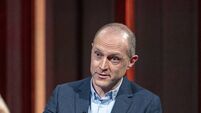Tommy Tiernan Show recap: A ‘former neo Nazi’ on his work against fascism and racism

Matthew Collins told the Tommy Tiernan Show he is 'a former neo Nazi who changed sides and went to work for the opposition'
Tommy Tiernan welcomed a wide range of guests on his chat show on Saturday night, with first guest Dara Ó Briain sharing details about his own adoption and his quest to find his birth mother.
Ó Briain’s adoption is detailed in his current ‘So… Where Were We’ tour and he shared the tale in Cork last summer at his Live at the Marquee gig. He told the Tommy Tiernan Show it is a different format of storytelling than he usually shares at his comedy gigs.







